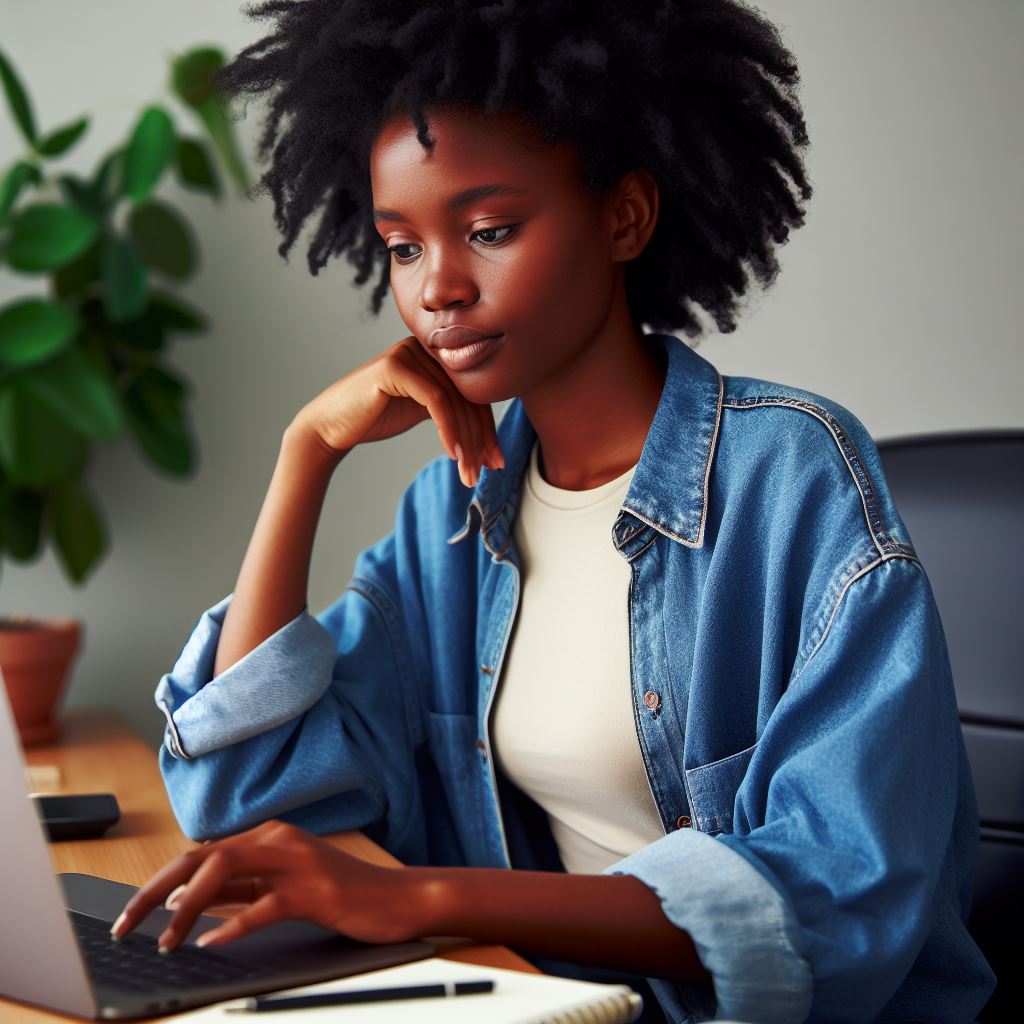Protecting Your Freelance Design Work: Nigerian Legal Tips
Last Updated on November 10, 2023
Introduction
This blog post will explore Nigerian Freelance Design Legal Tips.
Importance of protecting freelance design work
Freelance design work is a valuable asset, and it is important to protect it from unauthorized use or theft. By protecting your freelance design work, you can ensure that you are compensated for your work and that your rights are respected.
Nigerian context and legal aspects to consider
In Nigeria, there are a number of laws that protect the intellectual property rights of creators, including freelance designers.
These laws include the Copyright Act and the Trademarks Act.
The Copyright Act protects the original expression of ideas, including works of art, literature, music, and film.
The Trademarks Act protects words, phrases, symbols, and designs that are used to identify the source of goods and services.
Copyright Law in Nigeria
Nigerian Copyright Act and its relevance to freelance design work
The Nigerian Copyright Act is a legislation that protects various forms of creative expression.
This act is relevant to freelance design work as it safeguards the intellectual property rights of designers.
Copyright law provides designers with the necessary legal protection for their original designs.
Requirements for copyright protection
One requirement for copyright protection is that the work must be original and created by the designer.
The Act also protects the rights of designers by granting them exclusive rights over their creative works.
Designers have the sole rights to reproduce, distribute, and display their designs.
Copyright protection in Nigeria is automatic upon the creation of the design, without the need for registration.
This protection extends to both published and unpublished works, providing a comprehensive safeguard for designers.
Infringement of copyright occurs when someone uses, copies, or modifies a designer’s work without permission.
When a designer’s work is infringed upon, they can seek legal remedies and claim damages.
Copyright law allows designers to license their work to others, granting them limited rights to use the design.
Designers can negotiate licensing agreements with clients to specify the permitted usage and terms of their designs.
International copyright treaties, such as the Berne Convention, provide additional protection to Nigerian designers.
Designers should mark their work with the copyright symbol (©), their name, and the year of creation.
This marking serves as notice to others that the work is protected and reminds them to seek permission.
Filing a lawsuit for copyright infringement can be a complex legal process, requiring professional assistance.
Freelance designers should consult with intellectual property lawyers to ensure the best protection for their work.
Registering designs with the Nigerian Copyright Commission strengthens legal protections and provides evidence of ownership.
Registering designs also simplifies the process of pursuing legal action against infringers.
Ultimately, understanding and utilizing Nigerian copyright law is essential for freelance designers to protect their valuable creations.
By taking proactive measures to safeguard their intellectual property, designers can thrive in their freelance careers.
Registering Your Copyright
The process of copyright registration in Nigeria
In order to protect your freelance design work, it is crucial to understand the process of copyright registration in Nigeria.
This section will guide you through the steps of copyright registration and highlight the benefits it offers.
Benefits of registering your freelance design work
- Legal Protection: Registering your copyright provides you with legal evidence of ownership, making it easier to enforce your rights in case of infringement. It gives you the power to take legal action against those who use your work without permission.
- Deterrence: By registering your copyright, you send a clear message that your work is protected and unauthorized use will not be tolerated. This acts as a deterrent to potential infringers, reducing the risk of your work being copied or stolen.
- Enhanced Credibility: Registering your copyright adds credibility to your freelance design work. It demonstrates that you take your rights seriously and have taken the necessary steps to protect your creations.
This can be particularly beneficial when dealing with clients or potential business partners. - Licensing Opportunities: Copyright registration opens up opportunities for licensing your work. By registering, you can grant licenses to others for the use of your design, allowing you to generate income from your creations and expand your business prospects.
Step-by-step instructions for copyright registration
- Gather Your Materials: Before starting the registration process, make sure you have all the necessary materials. This includes a copy of your design work, proof of authorship, and any relevant supporting documents.
- Copyright Application Form: Obtain the Nigerian Copyright Commission (NCC) application form. You can either download it from their website or visit their office to obtain a physical copy.
- Complete the Form: Fill out the application form accurately and completely. Provide all the required details, including your personal information, the title of your work, and its description. Be specific and clear in your descriptions.
- Attach Supporting Documents: Attach any supporting documents that validate your ownership and authorship of the design work. This may include sketches, drafts, or contracts related to the creation of the design.
- Pay the Fee: Pay the required fee for copyright registration. The fee amount may vary, so check the NCC website or contact their office to get the current fee information.
- Submission: Submit the completed application form, supporting documents, and fee payment to the NCC office. Ensure that you have made copies of all the materials for your records.
- Confirmation and Certificate: After submission, you will receive a confirmation of receipt from the NCC. Once your application is processed and approved, you will be issued a copyright registration certificate.
- Copyright Notice: After obtaining the certificate, include a copyright notice on your freelance design work. This notice serves as a reminder to others that your work is protected and should not be used without permission.
Remember, copyright registration in Nigeria is not mandatory for copyright protection.
However, it is highly recommended as it offers significant advantages in terms of legal protection, deterrence, credibility, and licensing opportunities.
By following the step-by-step instructions provided, you can ensure that your freelance design work is properly registered and safeguarded.
Importance of Contracts
Significance of using contracts in freelance design projects
In the field of freelance design, contracts play a crucial role in protecting your work and ensuring a smooth collaboration with clients.
Here are the reasons why contracts are indispensable:
- Clear expectations: Contracts establish clear expectations for both parties involved in a freelance design project.
- Scope of work: Contracts define the scope of work, including deliverables, milestones, and deadlines.
- Payment terms: Contracts outline the payment terms, ensuring you are compensated fairly for your creative services.
- Intellectual property: Contracts address intellectual property rights and specify who owns the final design.
- Confidentiality: Contracts provide provisions for maintaining the confidentiality of sensitive project information.
- Dispute resolution: Contracts include clauses for handling disputes and specify the applicable jurisdiction for legal action.
- Termination: Contracts outline the conditions under which either party can terminate the agreement prematurely.
- Liability: Contracts limit your liability by clearly defining your responsibilities and the extent of your obligations.
- Contractual remedies: Contracts provide a framework for seeking legal remedies in case of breach or non-performance by either party.
Key elements to include in a contract
Now that we understand the significance of using contracts, let’s dive into the key elements that should be included:
- Identifying information: The contract should clearly state the names and contact information of all parties involved.
- Project description: A detailed description of the project, its objectives, and the specific design services to be provided must be included.
- Deliverables and milestones: Clearly define the deliverables and set milestones to track the progress of the project.
- Timeline: Establish a realistic timeline with deadlines for each deliverable or milestone.
- Payment terms: Specify the payment amount, schedule, and method of payment.
- Ownership and rights: Clearly state who owns the intellectual property rights to the final design.
- Confidentiality agreement: Include a provision to keep all project-related information confidential.
- Termination clause: Define the circumstances under which either party can terminate the contract.
- Dispute resolution: Outline the process for resolving disputes, such as through mediation or arbitration.
- Applicable law: Specify the laws of the jurisdiction that will govern the contract.
How contracts can help protect your rights and prevent disputes
In addition to providing a framework for collaboration and outlining project details, contracts also serve as a vital tool in protecting your rights and preventing potential disputes:
- Contracts establish a legally binding agreement, ensuring that both parties fulfill their obligations.
- Having a contract in place can deter clients from taking advantage of your work or trying to gain control over intellectual property without proper compensation.
- In case of a dispute, a well-drafted contract can serve as evidence of the agreed-upon terms and protect you from legal liabilities.
- Contracts provide a clear path for resolving conflicts, reducing the chances of expensive and time-consuming litigation.
- By clearly communicating expectations and responsibilities, contracts foster better client-designer relationships, promoting successful project outcomes.
In fact, contracts are an essential component of freelance design projects in Nigeria.
They not only establish clear expectations, but also protect your rights and interests.
By ensuring all key elements are included in a contract and seeking legal advice if necessary, you can safeguard your freelance design work and have a solid foundation for a professional and successful collaboration with clients.
Read: Nigeria’s Top Platforms for Marketing Freelancers to Join

Non-disclosure Agreements (NDAs)
In the world of freelance design work, protecting your designs is of utmost importance.
One legal tool that can help you safeguard your work is a Non-disclosure Agreement (NDA).
Understanding NDAs and Their Application in Freelance Design Work
NDAs are legally binding contracts that establish a confidential relationship between two parties.
In the context of freelance design work, an NDA ensures that all information and designs shared with the client remain confidential and cannot be disclosed to third parties without permission.
As a freelance designer, you may encounter situations where you need to share sensitive design concepts, sketches, or innovative ideas with clients.
By using an NDA, you can protect your intellectual property and prevent your designs from being stolen or replicated by others.
The Advantages of Using NDAs to Protect Your Designs
Incorporating NDAs into your freelance contracts offers several advantages.
- Protection of Intellectual Property: NDAs clearly outline the confidential nature of the information shared, explicitly stating that the client cannot use or disclose your designs without permission. This protects your unique creations and prevents unauthorized use.
- Establishing Trust: By using an NDA, you signal to your clients that you take confidentiality seriously, which can help build trust between both parties. This often leads to stronger and longer-lasting client relationships.
- Legal Recourse: In case of a breach of the NDA, the agreement serves as a legal document that can be used to pursue legal action against the offending party. This provides you with a means to seek appropriate remedies for any damages incurred.
Tips on Drafting an Effective NDA for Nigerian Freelancers
When drafting an NDA as a Nigerian freelancer, consider the following tips to ensure its effectiveness:
- Clearly Define Confidential Information: Include a specific definition of what constitutes confidential information. This can include design files, project details, sketches, and any other proprietary elements.
- Specify the Purpose and Scope: Clearly state the purpose for which the confidential information is being shared, emphasizing that it is solely for the intended project and cannot be used for any other purpose.
- Establish a Duration: Determine the length of time for which the NDA will be in effect. This should typically extend beyond the duration of the project to provide ongoing protection for your designs.
- Include Non-compete Clauses: If desired, you can include a non-compete clause in the NDA to prevent the client from using your designs to compete against you or hire someone else to replicate your work.
- Consult with Legal Professionals: It is always advisable to seek legal advice when drafting or reviewing an NDA. Consulting with a Nigerian lawyer familiar with freelancer rights can ensure that your agreement is legally enforceable and offers sufficient protection.
In short, NDAs are essential tools for Nigerian freelancers engaged in design work.
By using NDAs, you can establish trust, protect your intellectual property, and have legal recourse in case of breaches.
Make sure to follow the tips outlined above to create a comprehensive and effective NDA that safeguards your freelance design work.
Read: Best Practices for Nigerian Freelancers in Online Marketing
Watermarking and Metadata
The use of watermarks and metadata to protect freelance designs online
- Watermarks and metadata are powerful tools that can help protect your freelance design work online.
- The use of watermarks involves adding a visible mark or logo to your designs, making it easier to identify and claim ownership.
- Metadata, on the other hand, involves adding information such as copyright details, contact information, and creation date to your design files.
- Together, watermarks and metadata create a layered approach to protecting your freelance designs from unauthorized use.
How watermarks can deter unauthorized use and provide evidence of ownership
- Watermarks act as a visual deterrent, discouraging others from using your designs without permission.
- They make it difficult for individuals to pass off your work as their own, as the watermark serves as a constant reminder of your ownership.
- If someone does use your design without permission, the presence of a watermark can serve as crucial evidence of your ownership in legal proceedings.
- Watermarks can also act as a marketing tool, as they promote your brand and make it easier for potential clients to find and identify your work.
Tips on properly implementing watermarks and metadata on design files
- When applying watermarks, make sure they are visible enough to be easily seen but not overly obstructive to the design itself.
- Place your watermarks strategically, preferably in a location that is difficult to remove or crop out.
- Use a consistent watermark design across all your freelance designs to create a strong brand presence.
- Adding metadata to your design files is essential. Include your name or business name, contact information, and copyright details.
- Consider using metadata software or editing tools specifically designed for embedding metadata into your files.
- Regularly update your metadata to reflect any changes in your contact information or copyright status.
- For added protection, consider registering your design with relevant copyright agencies to strengthen your legal rights.
In general, watermarks and metadata play a crucial role in protecting your freelance design work online.
By implementing these measures, you can deter unauthorized use, provide evidence of ownership, and establish a strong brand presence.
Remember to apply watermarks strategically and use consistent designs to promote your brand effectively.
Additionally, make sure to include relevant metadata in your design files and keep it up to date.
By taking these steps, you can safeguard your hard work and ensure your designs are respected and valued in the digital realm.
Read: Overcoming Challenges Faced by Nigerian Design Freelancers
Dealing with Intellectual Property Infringement
Discovering that your freelance design work has been stolen or used without permission can be distressing.
However, there are steps you can take to protect your intellectual property rights.
Taking Action Against Infringement
- Gather evidence: Compile all relevant documents, including proof of your original work.
- Contact the infringer: Politely approach the individual or organization responsible for the infringement, informing them of the violation.
- Issue a takedown notice: If the infringer does not respond or refuses to comply, you can send a takedown notice to the web hosting provider or platform where the stolen work is being displayed.
- Consult an intellectual property lawyer: Seek legal advice to understand your rights and options for pursuing legal remedies.
Sending a Cease and Desist Letter
A cease and desist letter is a formal communication demanding the immediate cessation of unauthorized use of your freelance design work.
When sending a cease and desist letter:
- Use a professional tone: Clearly state your claim without resorting to threats or insults.
- Include relevant information: Provide details about your work, its copyright status, and the specific infringement.
- Demand action: Clearly state that the infringer must cease using your work and remove it from all platforms.
- Set a deadline: Specify a reasonable timeframe for the infringer to comply with your demands.
- Mention legal action: Notify the infringer that you will take legal action if they fail to comply with your requests.
- Engage an attorney: It is advisable to consult with an intellectual property lawyer to ensure the letter is legally sound and appropriate.
Seeking Legal Remedies and Initiating Legal Action
If the infringer does not respond to your cease and desist letter or refuses to comply with your demands, you may need to initiate legal action:
- Hire an attorney: Engage an experienced intellectual property lawyer to guide you through the legal process.
- Evidence collection: Prepare all necessary evidence, including documentation, witness statements, and expert opinions.
- Filing a lawsuit: Your attorney will help you prepare and file a lawsuit against the infringer in Nigerian courts.
- Legal proceedings: Attend court hearings, present your case, and provide evidence supporting your claim of intellectual property infringement.
- Potential outcomes: If the court finds in your favor, you may be granted injunctive relief, damages, and attorney fees.
Remember, protecting your freelance design work requires proactive measures, including copyright registration, watermarking, and maintaining detailed records.
In case of infringement, promptly take appropriate action to safeguard your creative rights.
Read: How to Build a Design Portfolio as a Nigerian Freelancer
Conclusion
It is crucial for freelance designers in Nigeria to take proactive measures to protect their work.
By understanding and adhering to relevant legal regulations, Nigerian freelancers can safeguard their creative assets.
Seeking professional legal advice when necessary can also provide additional protection and ensure compliance.
It is important for Nigerian freelancers to stay informed about any changes in the legal landscape that may impact their work.
Remember, as a freelance designer, your work is valuable and deserves to be protected.
By taking the necessary steps to secure your intellectual property, you can safeguard your creativity and maintain control over your designs.
Don’t underestimate the importance of protecting your freelance design work in Nigeria.
Stay informed, be proactive, and seek professional legal advice to ensure your creative assets are safeguarded.


